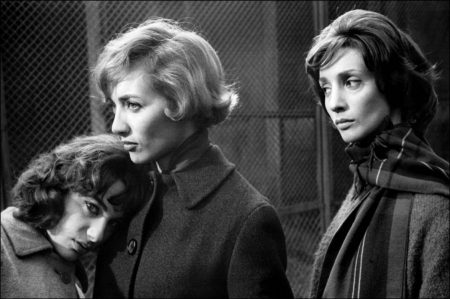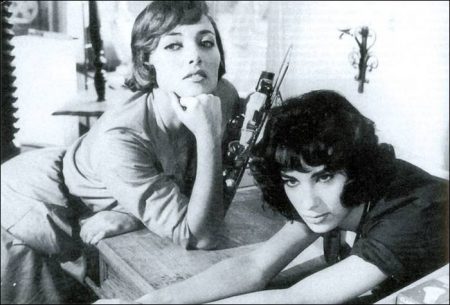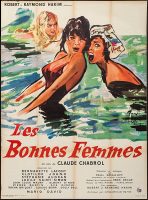Les Bonnes Femmes tells the story of four attractive single Parisian women and their domestic and romantic encounters. Several of them work as saleswomen in an appliance store, one moonlights as an entertainer, and all are pursued by Parisian men both good and bad. Jane is pursued by men and portrayed as being more ditzy and happy go lucky.
Ginette works during the night as an entertainer and reveals that she hates her day job with the other girls. Rita has a fiancé, but during dinner with his parents, one sees that he thinks very little of her as an intellectual and a person. Jacqueline is pursued throughout the film by a mysterious man on a motorcycle, and even turns down other men after developing feelings for him despite never meeting. However, after the two finally meet and proclaim their love for each other, the man murders Jacqueline in the forest and then flees on his motorcycle.
Les Bonnes Femmes is a French comedic drama directed by Claude Chabrol. Its mix of melodrama, absurd comedy and tragedy is typical for the early, experimental New Wave films. Though unsuccessful upon its initial release in France, it was subject to critical reevaluation, and is now regarded as the best of Chabrol’s early films. There are a considerable number of scenes set on the streets, and the viewer gets an expansive look at how Paris looked at the time, in night and day.
Film Review for Les Bonnes Femmes
“Les Bonnes Femmes,” one of Claude Chabrol’s earliest and best films, screens today through Wednesday at the Nuart with a new 35-millimeter print. Made in 1960 but unreleased in Los Angeles until 1976 and seen rarely, if ever, since then, “Les Bonnes Femmes” (Good Time Girls) today seems feminist in spirit, as Chabrol, in his third feature, explores the drab existences of four Paris shop girls.
Jane (Bernadette Lafont), Rita (Lucile Saint-Simon), Jacqueline (Clothilde Joano) and Ginette (Stephane Audran) are all clerks at a light fixture and electrical appliance store owned by a flamboyant old tyrant (Pierre Bertin). Audran would soon marry Chabrol and star in some of his most important films.
Their Paris, introduced so ironically by a shot of the Arc de Triomphe, is gray and unromantic. It is a world of cheap nightclubs and cafes filled with stale music and loud patrons. Uninhibited and rather coarse, Jane seeks only a man. So does Ginette, but she tries to escape the dull routine of her daily life by singing at night in a music hall. (She is terrified that the other girls will find her out and mock her inept attempt to play the sexy, glamorous chanteuse.)
A pretty, petite blond, Rita has landed a priggish fiance (Claude Berri, the future director) and is afraid his awful bourgeois parents–whom he sees as the epitome of culture–won’t accept her. Jacqueline, the loveliest, youngest and most vulnerable of the girls, indulges in romantic fantasies about a husky motorcyclist (Mario David) who keeps following her.
Despite its overall excellence, “Les Bonnes Femmes,” written by early Chabrol collaborator Paul Gegauff, has some awkwardly staged moments–the scenes of the girls at work seem particularly artificial. Although there’s a murder in the film, Chabrol shoves aside the mechanics of suspense almost entirely to engage us in a sensitive study of character. As a result, “Les Bonnes Femmes” remains one of his most individual–and most satisfying–works.
Les Bonnes Femmes (1960)
Directed by: Claude Chabrol
Starring: Bernadette Lafont, Clotilde Joano, Stéphane Audran, Lucile Saint-Simon, Pierre Bertin, Jean-Louis Maury, Albert Dinan, Ave Ninchi, Sacha Briquet, Jean Barclay, Rossana Rossanigo
Screenplay by: Claude Chabrol, Paul Gégauff
Cinematography by: Henri Decaë
Film Editing by: Jacques Gaillard
Art Direction by: Jacques Mély
Makeup Department: Louis Bonnemaison
Music by: Pierre Jansen, Paul Misraki
MPAA Rating: None.
Distributed by: Harold Cornsweet Films
Release Date: April 22, 1960
Views: 224


